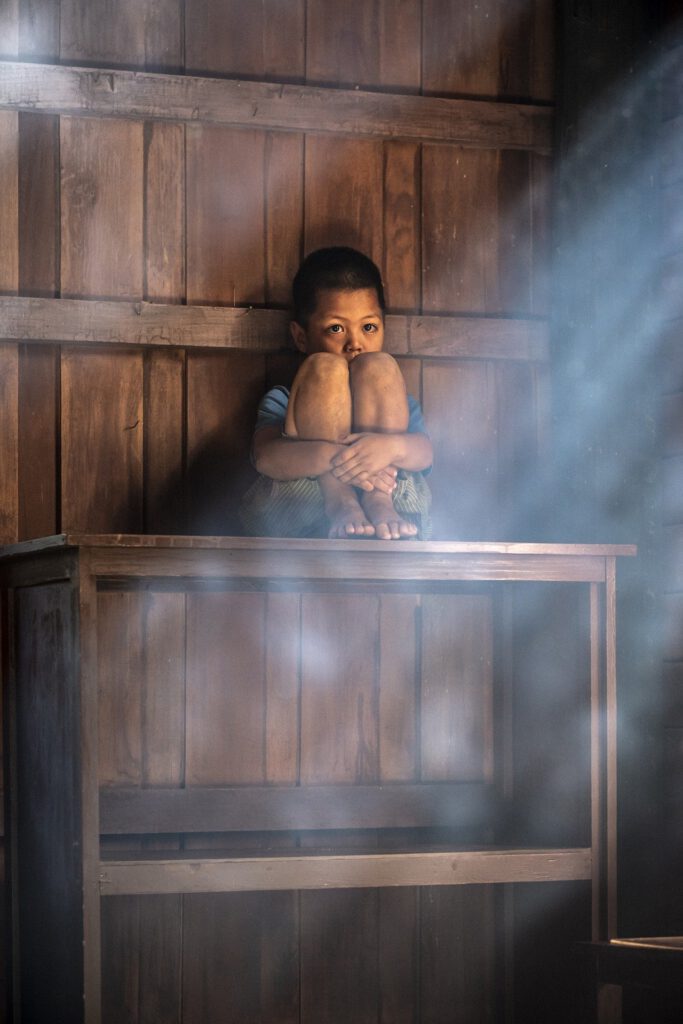Unfortunately, suffering through childhood trauma can have many faces. All faces of childhood trauma are equally ugly, as they hit vulnerable human beings when they cannot cope with poor parenting. Yet, not all of these faces are easily recognizable to trauma survivors and the environment.
There are four forms of childhood trauma: physical (including sexual), emotional, verbal and spiritual.
Generally speaking, there are four areas of childhood trauma children cannot cope with:
Physical childhood trauma
Physical childhood trauma includes all forms of corporal violence, including sexualized abuse: punishments like slapping, punching, hair-pulling, and hitting repetitively, furiously, or too forcefully. Over-disciplining or overworking a child likewise belong here, including not allowing children to play.
Emotional childhood trauma
Emotions turn into tools for traumatizing children by displacing anger or making them feel ashamed through facial expressions, body language, screaming, or charged tone of voice, overt or suppressed rage, hatred, humiliation, shaming, and intimidation. There is also what Pete Walker rightfully called “Emotional Incest”: using a child to fulfil a parent’s emotional needs. Punishment for emotional expression is another form of emotional childhood trauma: “Boys don’t cry.” “Nice girls don’t get mad.” “Stop crying, or I’ll give you something to cry about!
Verbal childhood trauma
Verbal childhood trauma is due to verbal debasement of any kind, like name-calling, destructive criticism, sarcasm, teasing, verbal humiliation, character assassination, “laundry listing”, lying, double binds, and double standards: “Just because I do it, that doesn’t mean you are allowed to do it too!
Spiritual childhood trauma
Any religious training that declares a child to be essentially bad, that the joys of life are sinful or threatening a child with God’s wrath and his terrible punishments in the future are as much a form of trauma as are beliefs that toxically shame a child’s healthy self, sexuality, or balanced self-interest. “Original sin”, “Eternal damnation”, or any kind of fundamentalism belong to this area of violence against children.
There are three levels of childhood trauma: violence, abuse, and neglect.
Depending upon intensity, three levels of childhood trauma can be differentiated: violence, abuse, and neglect.
Violence
The abusiveness of sexual, physical, emotional, verbal or spiritual violence is easily recognized. Therefore, even when repressed, such forms of violence lend themselves more easily to the recollection and recognition of survivors.
Abuse
Abuse, in this meaning, is a less severe form of violence. It also happens in all four areas of childhood trauma: physical/sexual, emotional, verbal, and spiritual. Trauma survivors often suppress abuse memories or idealize them as severe parenting principles of otherwise “good” parents.
Neglect
Of all the three levels of childhood trauma, this is the most insidious one: physical, emotional, verbal and spiritual neglect. In disruptive families, overt neglect usually leads to the intervention of responsible authorities. On the other hand, secret neglect often happens already early in infancy, and later often behind closed doors, so parents neglecting their children successfully manage to keep up appearances as respectable members of their local and/or religious communities. The neglect victims are either incapable of complaining about the neglect, or if they do – as with relatives, neighbours, or school teachers – they are reprimanded for being ungrateful and talking badly about their growing up in such a nice home. As systematic memories start around the age of 3,5 years, the earliest memories reaching back as far as 2,5 years, there is regularly no structured recollection of neglect during infancy, while the consequences – emotional flashbacks and shaky personality integration – are the more overwhelming and confusing for survivors of childhood trauma as they are for their surroundings.
But, whatever the area and level of childhood trauma, they all shatter the basic trust, our non-conceptual confidence that we are lovable beings, that the world is a safe and wonderful place, and that life is beautiful. We all need to learn this trust during our early infancy and grow up with the unshakable belief that there is something about the universe, human nature, and life that is inherently and fundamentally good, loving, and well-wishing. This immanent trust in life and reality manifests as a willingness is needed for us to muster the courage to take that plunge into the abyss. This deep trust manifests itself in everything – as an unquestioned sense of safety and security intrinsic to how we act and live. When this trust isn’t there, this lack of trust becomes so much a part of the fabric of our soul that it is pre-conceptual, preverbal, and even pre-conscious. Furthermore, it then becomes so shaky that trivial events and circumstances in our life can easily disrupt it. For this reason, basic trust is different from our usual psychological trust or confidence. Our trust in people and situations is conditional and highly dependent on familiarity and reliability. Painful experiences or personal betrayals can disrupt that trust in our life’s external and internal elements. Therefore, ordinary trust is of little value for stepping into the unknown because those conditions are always subject to change.
Without the visceral sureness that we are all part of one benevolent reality, our true nature is not any more reliably defined by ego experience in the physical body and therefore feels fundamentally vulnerable to being hurt or destroyed. It breaks the individual surviving childhood trauma out of its connectedness with this reality and into an eternal, subconscious and desperate struggle to ward off a faceless yet omnipresent doom.
Source:
The Tao of Fully Feeling: Harvesting Forgiveness Out of Blame, by Pete Walker




